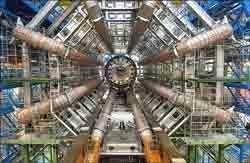Here we will talk about the evolving universe of fluids...
The universe used to be a super-hot liquid shortly after its birth, according to the first results of the experiments reconstructed the conditions of Big Bang or the Big Bang.
Scientists working on the world's largest particle breaker, the Large Hadron Collider at CERN near Geneva, Switzerland, found that exotic soups over 10 trillion degrees Celsius were created soon after the birth of the universe.
The sticky and hot material known as quark-gluon plasma is like a hot liquid, according to their findings.
It provides the perfect environment for the first particles and the atoms to form which then produces the stars and galaxies around us today. Similarly, as quoted from the #Telegraph (20/11/10).
The findings shocked physicists because the findings denied the accepted view of what happened immediately after the creation of the universe that Big Bang spewed superheated gas together to clump together to form matter.
"In the first occurrences of the universe, the material is actually like a very solid liquid," explains Dr. David Evans, a particle physicist at the University of Birmingham who is the leader of investigators in the experiment.
** These findings tell us about the early evolution of the universe that will inevitably have implications for its present form. **
"We have to do more analysis and give more thought to understand this, but this result is really amazing."
The results are the first results released by a multinational group of more than 1,000 researchers working on experiments with the Large Hadron Collider that began two weeks ago.
They use particle accelerators to destroy lead atoms together in a detector known as ALICE to create a "big bang mini" that is thought to mimic the conditions that exist in a fraction of a second after the universe was created.
The very small fireballs created inside the 27.3 km particle accelerator buried 5.2 km deep under the hills of the Alpine foot around the Swiss and French border, reaching over 10 trillion degrees centigrade for a second.
At this temperature the atoms and the particles that build it melt into parts of their principal elements known as quarks and gluons.
In general, physicists believe that at the high temperatures generated after the Big Bang, the energy normally binding quarks and gluons together will weaken significantly resulting in materials that are similar to gases.
A previous study five years ago at Relativistic Heavy Ion Collider in Upton, New York succeeded in creating a temperature of four trillion degrees and indicated that in this temperature the quark-gluon plasma is similar to the liquid, but many suspect that as the temperature rises, the plasma becomes similar gas.
But CERN's latest findings show that this is not the case and the results are expected to change conventional thinking in physics when scientists try to find out why the quark-gluon plasma is not as predictable.
Dr. Evans said: "The theories show that the energy holding the quarks begins to weaken at temperatures shortly after the Big Bang and the quarks will move freely like gas.
"We found that the strong energy holding the quarks still retains most of its power even at this high temperature, Kuark still interacting with each other much further than we think.
"These results will help us better understand the mysterious period before the protons and neutrons formed in the early universe."
Professor Brian Cox who is a particle physicist at the University of Manchester and the BBC's Wonders of the Universe series presenter who will soon be broadcast said that the discovery opened many questions about the early appearance of the universe.
He said: "They use various metaphors to explain how it looks because its shape will not be like any liquid we normally know."
"They talk about the power of interactions between quarks and how these particles behave together.The particles must interact more strongly than expected and therefore fluid-like.
"This experiment provides a new energy rule for us and therefore sees the unexpected trait very pleasing.The discovery is very interesting."
